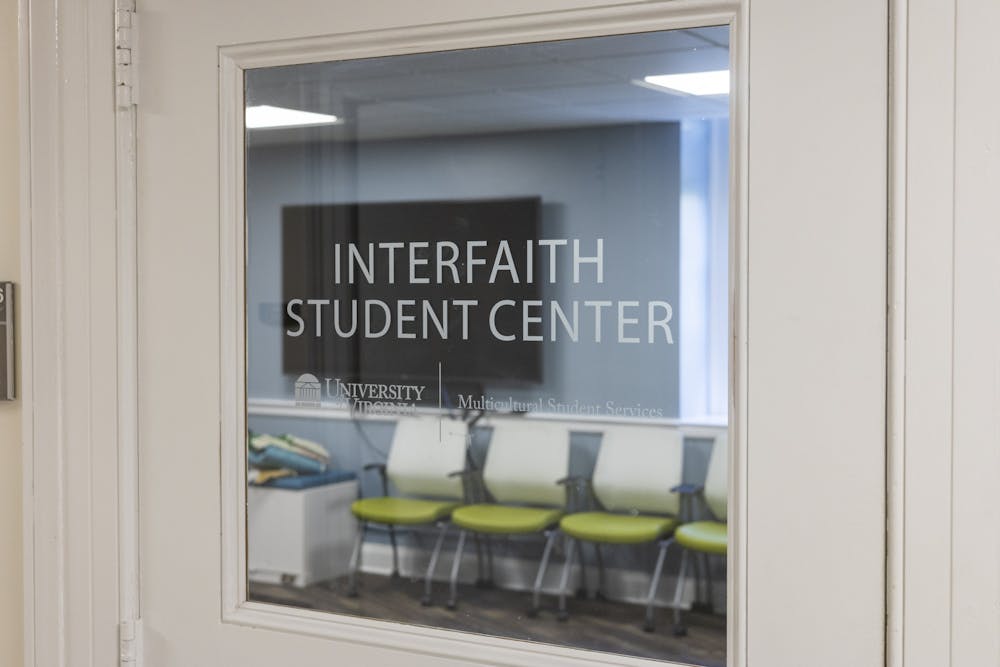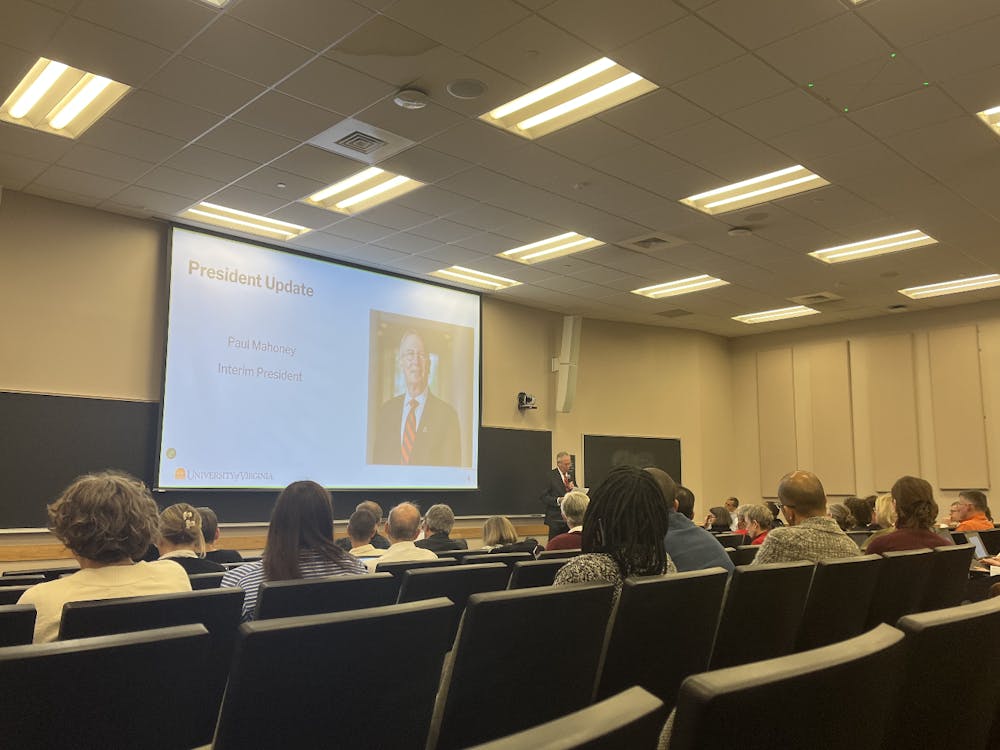As incoming first year students and their families began moving into residences across Grounds, the Board of Visitors held a special meeting Aug. 22 that ran over an hour past its planned time. There was only one action item on the Board’s agenda — endorsing the recommendations provided by the Task Force on Religious Diversity and Belonging, which quietly released its report online about halfway through the meeting, after delivering its recommendations to the University in the past month.
Ultimately, the Board did not vote to endorse the task force’s list of recommendations, but instead approved a different motion to endorse the broad notion of religious inclusivity. In addition, this motion directed the Board’s Academic & Student Life Committee to consider future action to reduce religious discrimination on Grounds. The motion passed nearly unanimously.
While the meeting agenda scheduled discussion of the report for the open session portion of the meeting, barring roughly three minutes of formalities, the meeting was held almost entirely in closed session. The Board is permitted to operate in closed session when discussing legal matters and issues pertaining to student safety and wellbeing.
The University announced the Task Force on Religious Diversity and Belonging in December with the stated purpose of developing a better understanding of the experiences and perspectives of religious staff, students and faculty on Grounds. The task force was composed of 11 members, including two students and four faculty members, though one faculty member, Religious Studies Prof. Oludamini Ogunnaike, resigned May 5, just one day after Virginia State Police cleared a pro-Palestine encampment outside the University Chapel.
The report states that the task force used survey data, held focus groups, engaged with reports of bias and discrimination and compared the University to other schools before providing recommendations. The 31 recommendations cover a handful of areas that are intended to improve feelings of respect, belonging and safety for religious members of the community, according to the report.
Though the University charged the task force with discussing the experiences of students across all religious minorities on Grounds, special attention was paid to Jewish and Muslim members of the community, according to the report.
In a 2022 Student Experience in the Research University survey conducted by the school, Muslim undergraduate students reported the lowest overall sense of belonging at the University, and Jewish and Muslim undergraduates were the least likely to say they felt their views were respected. The two religious groups were also the most likely to say they have been victims of religious bias or discrimination.
Alongside ensuring belonging and respect across diverse religious identities, the task force was also concerned with threats of bias, discrimination or harassment against religious members of the University community. The task force reviewed incidents of religious discrimination or harassment reported to the University Police Department’s Threat Assessment Team, as well as the Office of Equal Opportunity and Civil Rights.
Ian Baucom, executive vice president and provost, said at an Aug. 23 Faculty Senate meeting where he told the Senate about the report that both of those departments will likely see new hires to address reports of religious discrimination and harassment.
Concerning safety and threat prevention, the task force recommended that University administration should review and improve incident reporting processes, as well as provide clearer education around University policies, safety measures and resources. The report also said that the University should talk with groups affected by an issue before releasing a formal statement. Another University-operated task force — the Committee on Institutional Statements — is currently deliberating over how the University should respond to critical events.
“It is advisable for University leadership to first consult affected groups to benefit from their perspective and seek their advice,” the report reads.
A number of the task force’s recommendations relate to providing accommodations for religious students and community members. Baucom told the Faculty Senate that some of the recommendations that will be immediately implemented include adding more prayer and meditation spaces, as well as expanding conversations between religious leaders and University President Jim Ryan. Baucom said that future plans include reviewing holiday schedules and leave policies to accommodate religious employees’ needs.
One other accommodation that the task force highlighted — and that Baucom said would receive immediate attention from administrators — was dining options at the University. While the University has made efforts to accommodate some religious dietary needs — including offering meals for students practicing Ramadan, a period of fasting in Islam corresponding to the ninth month of the faith’s calendar — students in focus groups told the task force that they would appreciate more religiously diverse dietary options, including halal and kosher food.
The task force also identified a need for more dialogue and understanding across religious identities. In addition to President Ryan planning to hold more meetings and conversations with local religious leaders and students, the task force identified a need for more interaction across religious differences. This could include hosting “Dialogue Dinners” through the Constructive Dialogue Institute and ensuring that the Interfaith Student Center has sufficient resources for programming and fostering constructive dialogue across religious backgrounds.
Another notable finding from the task force pertained to the degree of resources and academic offerings in certain academic areas, including politics and cultures of the Middle East.
The report states that over the past decade, “several” faculty members with academic interests around these subjects left the University and that across all schools at the University, only 36 Spring 2024 courses were relevant to issues of religious cultures, traditions and discrimination.
The task force recommended hiring more faculty in these areas, expanding course offerings that would allow for studies of multiple religions and allocating more funds for conferences and academic programs related to religious histories and cultures. The report points to Dartmouth College’s Middle East Dialogues — where faculty from different subjects teach courses focused on the Middle East together — as a program worthy of emulation.
Towards the end of the report, after a compilation of all recommendations, the task force included an essay tying their work to previous University working groups, particularly those after the 2017 Unite the Right rally in Charlottesville, where far-right groups marched on Grounds, ultimately leading to the murder of one counter-protester.
The task force’s report stated that the University did not address all recommendations provided by other task forces and working groups following the rally, and that further action should include inquiring as to how the findings of those task forces and the Task Force on Religion and Diversity intersect.
Baucom said that some issues raised by the recommendations will require more long term attention, saying that one recommendation notes that Muslim students do not currently have a designated chaplain on Grounds — which could help for programming and counseling — but that the University cannot directly hire one due to legal restrictions on separating religion from public institutions.
The 2024 SERU survey was open for students to respond to throughout the previous spring semester, and results will likely be released this fall. The results will provide more timely information relevant to the task force’s recommendations, as responses around religious respect and belonging will account for the political atmosphere following Hamas’ Oct. 7 incursion into Israel and Israel’s subsequent military campaigns in the Gaza strip that have prompted student protests across the country.
One such demonstration was an encampment at the University, which police — including state troopers in riot gear — forcefully cleared May 4.
"All members of our community must feel that they are a vital part of this place, recognize themselves in our mission, and know that they belong,” Baucom wrote in a memo that prefaced the report. “All of us need to experience this, across all our diversities and commonalities — religion deeply among them.”







